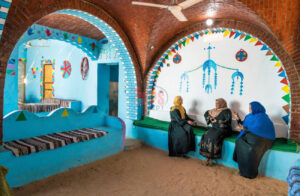Understanding Nubian Culture and Heritage
Nubian culture is a profound amalgamation of history, language, art, and social structure, shaped by the geographic uniqueness of the Nubian region, which straddles the southern borders of Egypt and northern Sudan. This distinctive area is characterized by the Nile River, which has historically served as a lifeline for the Nubian civilization, contributing to its agricultural wealth and facilitating trade and cultural exchanges with neighboring civilizations. The rich tapestry of Nubian heritage includes vibrant oral traditions, music, and dance, reflective of their deep-seated connection to the Nile and the surrounding landscapes.

Historically, Nubia is known for its ancient kingdoms, notably the Kingdom of Kush, which emerged as a powerful civilization, rivaling that of ancient Egypt. Nubian artisans were renowned for their craftsmanship, producing intricate jewelry, pottery, and textiles that showcased their unique artistic skills. The Nubian language, belonging to the Nilo-Saharan language family, adds another layer of cultural richness, with its own dialects reflecting regional diversity within the Nubian community.
However, the Nubian community has faced significant challenges, particularly in the 20th century due to the construction of dams, such as the Aswan High Dam, which led to mass displacement and the submerging of villages that had existed for centuries. This displacement has not only impacted their physical landscape but has also posed threats to their cultural identity and traditions. Efforts to preserve Nubian culture today are paramount, as the community strives to maintain their unique customs, language, and art forms amidst modernization and challenges of diasporic existence. This commitment to heritage is not merely about survival; it represents a vibrant expression of identity that transcends geographical boundaries, ensuring that Nubian culture continues to flourish in both its traditional forms and contemporary expressions.
Modern Challenges to Nubian Identity
The Nubian culture, rich in history and tradition, faces modern challenges that pose significant threats to its continuity and identity. Urbanization is one of the primary factors contributing to the gradual erosion of Nubian cultural practices. As cities expand and development projects proliferate, Nubian communities, particularly those residing along the Nile, find their traditional lands encroached upon or outright displaced. This disruption often leads to the migration of Nubians towards urban centers, where the hustle of modern life and the pressure to conform can impede the transmission of cultural values and practices to future generations.
Globalization further complicates the preservation of Nubian culture. The influence of global media and Western consumer culture can dilute local traditions and languages. Traditional forms of expression, such as music, dance, and storytelling, are often overshadowed by more commercially viable global forms of entertainment. Consequently, younger generations may increasingly gravitate towards these globalized practices, which could diminish their interest in preserving their Nubian heritage. Furthermore, this cultural shift, fueled by accessible social media, risks homogenizing the distinctive features of the Nubian way of life.
Government policies also play a crucial role in shaping the current landscape for Nubians. Many Nubians feel marginalized within the broader Egyptian state and argue that their rights and recognition are insufficiently addressed. The lack of political representation amplifies their struggles, particularly in relation to language preservation, as many young Nubians are not proficient in their indigenous language. Personal narratives from Nubians underscore the emotional toll of these challenges; testimonials reflect a longing for cultural affirmation and the fear of losing a unique identity. As Nubians navigate the complexities of modern life, their commitment to preserving their cultural heritage remains vital in confronting these contemporary challenges.
Initiatives for Cultural Preservation
The preservation of Nubian culture in Egypt is being actively championed through various initiatives, spearheaded by non-governmental organizations (NGOs), community groups, and dedicated cultural activists. These entities play a pivotal role in fostering an understanding of Nubian heritage, promoting its unique identity, and ensuring that future generations can engage with their rich history. One significant focus of these initiatives is the revitalization of the Nubian language, which has faced decline due to external influences and modernization. Efforts are being made to teach the language in schools and community centers, ensuring that this essential aspect of Nubian culture is not lost.
Moreover, traditional arts and crafts, including intricate textiles, pottery, and music, are being revitalized through workshops and training programs hosted by local artisans. These programs not only support the craftsmanship of the Nubians but also provide a space for cultural exchange, enriching the overall tapestry of Egyptian heritage. Festivals and cultural exhibitions are critical in this context, serving as platforms where Nubian customs can be showcased and celebrated. Events such as the annual Nubian Festival of Arts unite the community and attract visitors from other regions, promoting awareness and appreciation of Nubian culture.
Storytelling also plays a vital role in the preservation of Nubian identity. Through oral traditions, histories and moral lessons are passed down, ensuring that the essence of Nubian life is maintained. Storytelling events are organized in various settings, ranging from community gatherings to formal exhibitions. Furthermore, collaborations between Nubian communities and larger cultural institutions in Egypt facilitate broader engagement, contributing to the enrichment of national heritage. These partnerships strengthen the position of Nubians within the wider cultural narrative of Egypt, emphasizing their significance and contributions to the nation’s diverse identity.
The Future of Nubian Culture: Opportunities and Hope
The future of Nubian culture in Egypt holds significant promise, particularly through the integration of modern technology and the effective use of social media platforms. These digital tools provide unprecedented opportunities for cultural preservation and dissemination, allowing the Nubian community to share their rich heritage with a global audience. By utilizing social media, Nubians can engage with both local and international supporters, raising awareness about their traditions, language, and customs. This exposure not only facilitates cultural exchange but also fosters a greater appreciation for Nubian identity in an increasingly interconnected world.
Moreover, youth engagement is critical for sustaining Nubian culture. The younger generation plays a pivotal role in keeping traditions alive through various cultural initiatives. Educational programs can help them connect with their ancestry while encouraging participation in community activities that highlight Nubian arts, crafts, and oral histories. Young people are often at the forefront of adopting new technologies and can utilize these skills to document and promote their cultural practices, ensuring that they are not lost to future generations.
Global support for indigenous cultures is increasingly important, as seen through both governmental and non-governmental efforts. Initiatives aimed at protecting cultural expressions and languages can create a supportive environment for the Nubian community. Such partnerships can lead to projects that enhance cultural visibility, stimulate entrepreneurship, and promote tourism that is respectful and informed about Nubian traditions. By aligning with entities that advocate for the rights and recognition of indigenous peoples, Nubians can gain a platform to voice their needs and ambitions.
In conclusion, the resilience of Nubian communities is evident in their commitment to maintaining their cultural heritage amidst modern challenges. By leveraging technology, engaging the youth, and receiving global support, there is ample opportunity for the Nubian culture to thrive and evolve, ensuring that its rich history continues to be celebrated for generations to come.


